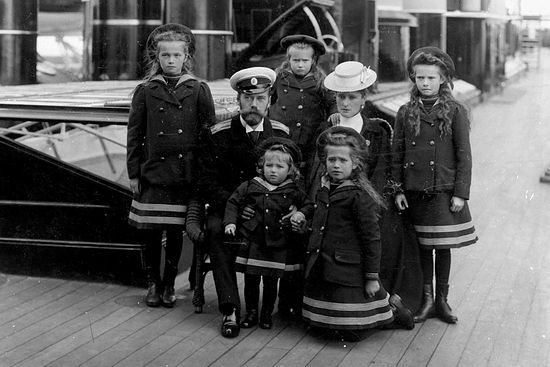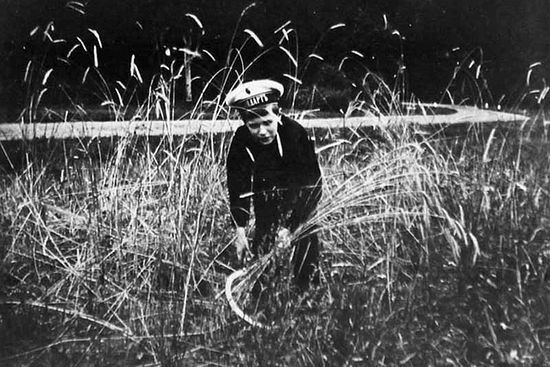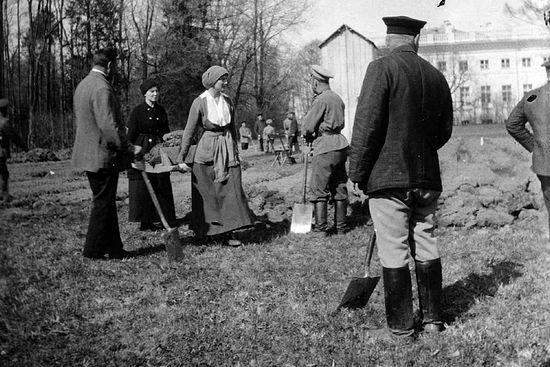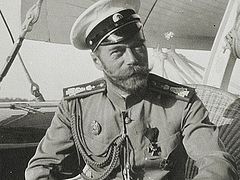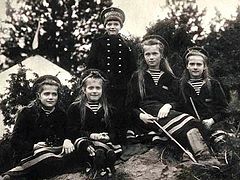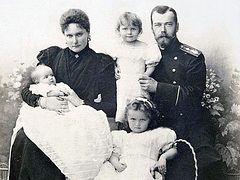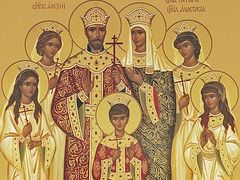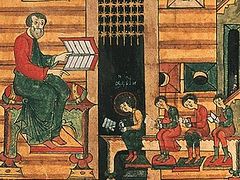Emperor Nicholas II (1868-1918) was an ideal family man, husband, and father, and the empress the model of a loving wife and caring mother.
Daily routine
In any book on raising children, the authors will necessarily recommend a rough daily schedule for children of any age. Of course a schedule is very necessary and important (provided, of course, that it doesn’t turn into constant torture for the children). And it would all be good, except for one thing: There’s no time stipulated for prayer. But without that, without the sanctification of the coming day by turning to God, all the rest is no longer that important. It was different in the family of Emperor Nicholas Alexandrovich. “The whole external and spiritual way of life at home for the royal family was a typical example of the pure, patriarchal life of a simple Russian religious family,” recalls General-Lieutenant M. K. Dieterichs, the author of the book The Murder of the Royal Family and Members of House of Romanov in the Urals. “Getting up in the morning or lying down in the evening, every family member read his prayers, after which in the morning, having gathered together when possible, their mother or father would loudly read the Gospel and Epistle appointed for the day to the other members of the family. Similarly, when sitting down or getting up from the table after eating, each would read the appointed prayer and only then take up food or leave for his room. They never sat at the table if their father was held up by anything. They waited for him.”
In this family, the alternation of various activities was also regulated and observed in a rather strict regime—but not so strict so as to become unbearable for the children. The daily routine did not burden the tsarevnas and the tsarevich.
When the imperial family was at Tsarskoe Selo, their lives bore a more familial character; receptions were limited. The retinue did not live in the palace; therefore, the family would gather at the table without anyone from outside. The children, getting older, had lunch with their parents. Pierre Gilliard1 has left a description of the winter of 1913-1914, which he spent with the family in Tsarskoe Selo. Lessons with the heir began at 9:00 AM, with a break from 11:00 till noon. During this break, he would go for a ride in a coach, a sleigh, or a car, and then classes would resume until 1:00 PM. After lunch, the teacher and student would spend two hours outside. When they were free, the Grand Duchesses and the sovereign would join him, and Alexei Nikolaevich would have fun with his sisters, going gown the icy hill that was built on the shore of the small lake. Lessons resumed at 4:00 until dinner, which was served at 7:00 for Alexei Nikolaevich, and at 8:00 for the other members of the family. The day would conclude with reading aloud from books.
Idleness was completely foreign to all members of the imperial family even after their arrest. According to M. K. Dieterichs, “They got up at 8:00 AM; prayer, morning tea all together… They were allowed to go for a walk twice a day: from 11:00 to 12:00 in the morning and from 2:30 to 5:00 PM. During their free time from their lessons, the empress and her daughters would sew, embroider, or knit something, but they were never left without something to do. The tsar would read during this time in his office and put his papers in order. In the evening, after tea, the tsar would go to the daughters’ room; they put a chair and small table there for him, and he would read Russian classics aloud, and his wife and daughters, listening, would do needlework or painting. The tsar was accustomed to physical labor from his childhood and accustomed his children to it as well. The emperor would usually use his hour-long morning walk for exercise, with Prince Dolgorukov2 accompanying him for the majority of it; they would discuss modern topics that Russia was experiencing. Sometimes instead of Dolgorukov, one of his daughters would accompany him, when they recovered from their illnesses. During the daily walks, every family member, with the exception of the empress, would engage in physical work: clearing snow from the park paths, picking ice for the storage cellar, or chopping off dry branches, cutting down old trees, and storing up firewood for the coming winter. With the onset of warm weather, the whole family would work on organizing a large garden, and some of the officers and security soldiers took part in this work with them, having already become accustomed to the royal family and desiring to show them their attention and goodwill.”
Pierre Gilliard also writes about this, telling about the royal family’s confinement in Tobolsk: “The emperor suffered from a lack of physical labor. Colonel Kobilinsky, to whom he complained about it, ordered birch trunks to be brought, then he bought saws and axes, and we were able to store up firewood, which we really needed in the kitchen and also in the house for heating our furnaces. This work in the open air was great entertainment for us during our stay in Tobolsk. The Grand Duchesses in particular took an ardent shine to this new sport.”
Here it should be noted that even before their arrest, the Grand Duchesses had not shunned activities, such as, for example, weeding the garden. During the First World War, the older daughters were stretched to their limits. The empress always made an effort to provide real help to others, and she engaged the children in acts of charity.
Education
Alexandra Feodorovna was mainly engaged with the children’s education. Pierre Gilliard, recalling his first lessons with Olga and Tatiana, who were then ten and eight years old respectively, described the empress’ attitude to her daughters’ lessons: “The empress did not miss a single word I said; I had a very clear feeling that it wasn’t a lesson I was giving, but an exam I was undergoing… The following weeks, the empress regularly attended the children’s lessons… After her daughters had left, she often had to discuss techniques and methods for teaching living languages with me, and I was always amazed by the common sense and astuteness of her judgments.” Gilliard was clearly surprised by the empress’ attitude and “kept perfectly clear recollections of the great interest with which the empress related to the upbringing and education of her children, entirely devoted to her duty.” He tells about how Alexandra Feodorovna wanted to instill respect for their mentors in her daughters, “demanding from them order, which is the first condition of politeness… When she was present at my lessons, upon entering I would find books and notebooks carefully placed on the table before each of my students. I never had to wait a single minute.”
Not only Gilliard witnessed the empress’s attention to her children’s lessons. Sofie Buxhoeveden3 also writes: “She liked to be at the lessons, and to discuss the direction and content of the classes with the teachers.” Alexandra Feodorovna herself told the emperor in a letter: “The children have begun their winter lessons. Maria and Anastasia are unhappy, but Baby doesn’t care. He’s ready to learn even more, so I said lessons would last instead for forty-five minutes, since now, thank God, he is much stronger.”
Some opponents of the canonization of the royal family were outraged: How could Orthodox parents, having the opportunity to choose mentors for their children, appoint foreign, heterodox teachers for them? Turning to the recollections of A. A. Taneyeva,4 we will see whether this august couple erred in this:
“The senior teacher who supervised their education was a certain P.V. Petrov. He appointed other teachers for them. Besides him, there were the foreigners Mr. Gibbs5 and Mr. Gilliard. Their first teacher was Mrs. Schneider, formerly a teacher for the Grand Duchess Elizabeth Feodorovna. She had taught the Russian language to the young Grand Duchess and remained at court. Trini, as the Grand Duchess called her, did not always have a pleasant character, but she was dedicated to the royal family and followed them to Siberia. Of all of the teachers, the children of Their Majesties loved Gilliard most of all, who first taught the Grand Duchesses French, and later became the tutor for Alexei Nikolaevich; he lived at court and enjoyed the full confidence of Their Majesties. They also really loved Mr. Gibbs; they both followed them to Siberia and remained with the royal family, until the Bolsheviks separated them.”
Even after the entire family’s arrest, the august parents, not knowing what awaited them in the future, decided that the children should not interrupt their studies. “As their Highnesses recovered, they began their lessons, but since their teachers were not allowed to see them, except for Gilliard, who was also arrested, Her Majesty divided these duties between everyone. She personally taught all the children the Law of God, and His Majesty taught Alexei Nikolaevich geography and history, and the Grand Duchess Olga Nikolaevna taught her younger sisters and brother English, Ekaterina Adolfovna Schneider taught arithmetic and Russian grammar, Countess Genne taught history; Doctor Derevenko was entrusted with teaching Alexei Nikolaevich the natural sciences, and my father worked on Russian reading with them. They were both fond of Lermontov’s lyrics, which Alexei Nikolaevich learned by heart; he also wrote essays about paintings, and my father enjoyed these lessons,” wrote T. S. Melnik-Botkina.6
Entertainment
That the royal children never sat idle doesn’t mean they never rested. The empress also considered children’s games to be something very important: “It’s simply a crime to repress childlike joy and to force children to be gloomy and serious… Their childhood should be filled with joy, light, and fun games whenever possible. Parents should not be ashamed of playing and fooling around with their children. Perhaps precisely then they are nearer to God than when they are doing what they think is the most important work.”
For parents who want to listen to the wise advice of the empress Alexandra Feodorovna, these words can be a warning against two mistakes. First: Parents have a tendency to sharply limit childish fun, often forgetting that kids are kids and that they mustn’t constantly sacrifice their games for lessons, even the most important ones. Second: you should not allow your child to drift, not being interested in any activities during leisure hours—for example, allowing your children to spend hours on end playing computer games, as many mothers do. Organizing children’s games unobtrusively and wisely is a great talent. Fortunately, the royal children had wise, loving parents, always ready to share in their fun, and therefore the Grand Duchesses’ and the heir’s relaxation was always happy and healthy.
If parents now would play with their children, or at least simply think about what to play and how to entertain their children, they could avoid many problems. That’s not an exaggeration. What is a game for a child? An act of creativity and knowledge, and the first lessons in life. Normal children’s games develop a child, teaching him to make decisions and be independent. However, this doesn’t mean children’s games must be strictly regimented. Otherwise, parents, afraid of falling into the first two mistakes, make a third mistake—they start constantly interfering in their child’s games, from their adult vantage point, wanting to make them “correct” and “developmental.”
Tsar Nicholas Alexandrovich also really loved to spend time with his children, playing with them. “During their daytime walks, the tsar, loving to go for walks, would usually walk around the park with one of his daughters, but he also had chances to join us, and with his help we once built a huge snow tower, which took the form of an imposing fortress and kept us occupied for several weeks,” writes P. Gilliard. Thanks to Nicholas Alexandrovich, his children loved physical exercise. The tsar himself, according to Julia Den, loved to be out in the fresh air, was an outstanding marksman, and an excellent athlete. He had exceedingly strong hands. His favorite pastime was rowing. He loved kayaking and canoeing. When the imperial family used to go on vacation in the Finnish skerries, the emperor would spend whole hours on the water.
External entertainments, like trips and balls, were practically unknown to the royal children. They invented their own pursuits, besides outdoor games, walks, and physical exercise—for example, they organized home theater performances. These small plays were always joyful events, giving the children and their parents hearty rest, even in the tragic days of their confinement. The Grand Duchesses really loved to solve puzzles. And Tsarevich Alexei, like any boy, collected all sorts of little things in his pockets—pins, strings, and so on.
Summer trips to the skerries or to Crimea were a great joy for the royal children. During these trips, the sailors taught the children to swim. “But even besides swimming, there were many joyful things in these trips: boating, trips to the shore, to the islands, where they could fool around, and gather mushrooms. And how many interesting things there were on the yachts and ships that accompanied them! Rowboat and sailboat races, fireworks on the islands, ceremoniously lowering the flag,” recalls P. Savchenko.
The whole family loved animals. Besides dogs and cats, they had a donkey Vanka that the tsarevich really loved to play with. “Vanka was an incomparable, smart, and funny animal,” P. Gilliard recalls. “When they wanted to give Alexei Nikolaevich a donkey, they spent a long time going around to all the horse dealers in St. Petersburg, but in vain; then the Ciniselli Circus agreed to give up their old donkey, which was already too infirm for performances. That’s how Vanka appeared at court, fully appreciating the palace stables apparently. He greatly amused us, because he knew many of the most incredible tricks. With great dexterity, he would turn pockets inside out, hoping to find some candy. He found special charm in old rubber balls that he would casually chew, one eye closed like an old yank.”
Thus, according to the memories of people who knew the imperial family well, Emperor Nicholas II’s four daughters and his son enjoyed leisure time. Their games and amusements contributed to the family’s unity not only in joy, but also in sorrow, when the imperial family gave an amazing example of love, unanimity, and solidarity in the face of mortal danger to those hostile to them during their confinement.

